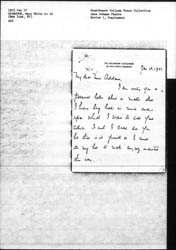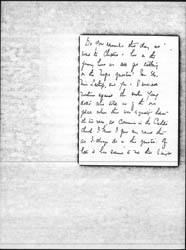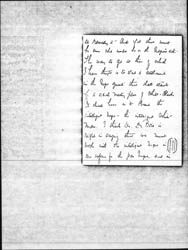My dear Miss Addams,
I am writing you a personal letter about a matter that I have long had in mind and upon which I want to ask your advice. I wish I could see you, but that isn't possible so I must do my best to make myself understood this way. [page 2]
Do you remember that day we went to [Chatns?] & how on the journey home we all got talking on the Negro question? Mr. Ely, Miss Lathrop, and you & I were all northerners against the southern young doctor who told us of the one place where there was equality between the two races, at Communion in the Catholic Church. I know I grew very earnest then as I always do on this question. Of late it has seemed to me that I might [page 3] do something with my earnestness right here in New York City. That the Negro in the ↑northern↓ Cities is as much in need of recognition as any where in the U.S. My thought is this: -- The economic position of the Negro here in N.Y. is a difficult one. He is excluded in one way & another from most trades and is forced into the least intelligent, poorest paid forms of labor -- of course we all know that; but I cannot find that here in N.Y. any one ↑number of people↓ seems much concerned about it, or try [page 4] to remedy it. And yet there must be some who would be on the Negro's side. The way to get at those of which I have thought is to start a settlement in the Negro [quarter] that shall stand for a social meeting place of Whites & Blacks. I shall have on [its] [Board] the intelligent Negro & the intelligent White Man. I think Dr. Du Bois is right in saying that we must work with the intelligent Negro in one reform for the poor Negro, and in [page 5] one work for the Negro who is in poverty should be for the honest and industrious Negro not he who is shiftless & willing to live on charity.
You remember what Du Bois says of the Negro in Philadelphia, that it is the Negro who is willing to work & who is ambitious to do right whom the city neglects. I want to see the men in New York who are interested in the Negro, who are ready to [illegible] send money to Tuskegee [page 6] and to dine Booker Washington, & turn to the problem here, & work with the [illegible] Booker Washington in New York to better Negro conditions at home. I do believe some of them would do it. I have only spoken of this to one man, and have asked him to consider it for a time as a confidence, as I ask you, but he was in favor of my plan -- that was Mr. Chas B. Spahr. He advises me to go to Mr. Page, & Mr. Baldwin -- the L.I.R.R. president who [page 7] is interested deeply in Tuskegee.
Tell me what you think of my plan. What I would ask for would be for a settlement in the Negro quarter in N.Y., community situated & not in a bad neighborhood -- say in the thirties 30s between Sixth & Seventh Ave. There those in [favor] of us, at least one man, should [start] and endeavor to learn what the neighborhood needs, helped by the intelligent, well-to-do Negros. I myself should suggest that one resident be a Negro, perhaps the trained nurse. But that better to come in time. The Board should [page 8] be made up of men & women who were willing to work with Negros, and to meet them in an equality at the settlement. If it were a [Christian] settlement if this were patronage of the race by another, I should not care for it -- or rather, if we did not set our faces deliberately against patronage. I suppose we all [would] at times patronize, but let us be ashamed of it if we do & not believe in it.
Does this sound like a Utopia? Tell me, if, Utopian or not, it has your sanction? Your opinion I care for more [page 9] than that of any one else. I hope so I seem to you to be striving for a right thing. I would not force a Negro's society on anyone, but I believe there are ↑White↓ men & women in N.Y. who would be glad of the opportunity to meet the intelligent colored man and to assist him in his struggle to advance in the world. My settlement should be a [illegible] social center for Negros who come to New York, too. There they [page 10] might pleasurably [meet] at dinner those near with whom they have long corresponded and who want to meet them. Mr Spahr said that this place was very [plausable?] to him.
I say my settlement for I cannot plan it without putting myself in charge. I have had six years experience here, and I think this settlement stands pretty well among the smaller settlements, does it not? I ask in all humility. I do not want to take up this new work if I am not qualified for it, [page 11] but I want so much to help the Negro race that I could promise to bring to any work all the power and all the courage I have. It would require much of the latter, wouldn't it?
I don't want to resign from here, where I am very happy, until I think there is some prospect of my plans going through. Tell me what you think as soon as you can will you not? It is too [bad?] I should make you write, [page 12] but you can perhaps answer ↑all↓ this in a few words.
Oh, I want to do it so! But I'm old enough not to rush ahead if isn't wise. My action would make many of my friends & relations unhappy, and I must not trust too wholly to my own judgment. What I plan I know is just and right, but it may not a nice step [today]. And yet each day that I pick up the newspaper I want more than ever to place myself as a friend to an unjustly treated race.
I hope all goes well with you in Chicago --
Sincerely, Mary White Ovington.














































Comments